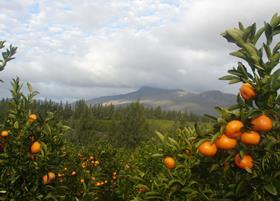
Fruit with exceptional taste and market timing will herald the future of the South African business in future, in particular in the stonefruit and grape categories.
“The essence of our programme,” explains Hans Christiaan Muylaert-Gelein of the Unlimited Group, “is the quest for high eating quality plums and raising the bar from ratios of 12 brix – which have been common in the past – to 16 to 20 brix in a few years’ time. We are also aiming to establish the pluot (a plum/apricot) firmly in our country, breeding plums of larger sizes and introducing the ‘Dapple’, which are green skin, red-flesh plums.”
Then there is the aim to introduce varieties of apricots and plums in the market at exactly the right time of year. This is where perhaps the most exciting news comes in – the emergence of Flavor Fall as the first exceptional late plum and the ‘next big thing’ in South African stonefruit.
“There is a natural fit between our offer and what drives sales in the UK supermarkets,” says Pieter du Toit of Dutoit Agri. “For example our nectarines sell really well because of good taste, and good taste is an important driver in all of the supermarkets.”
In table grapes, new plantings in the early areas along the lower end of the Orange River will bring increased volumes of seedless red varieties such as Sweet Celebration to the UK market. In the niche fruits, Re:inc, a breeder based in Paarl, is focusing on a new range of figs and pomegranates, which will be popular with many Britishconsumers.
Quality assurance
The creation of the Perishable Products Export Control Board (PPECB) more than 90 years ago has proved to be the basis for a quality assurance system that has brought a great deal of confidence in the fruit quality offered by South Africa, and which is still serving the industry in the modern era.
Governed by an act of the South African Parliament, PPECB is empowered to certify the quality of a number of South African agri products, including fruit and vegetables. The inspection of the fruit takes place in South Africa according to EU and other standards that are sometimes applied in the particular countries. This is a huge benefit for the South African trade supplying the UK because there is no need for further inspection on arrival.
PPECB was founded in the mid 1920s and had the immediate effect of bringing discipline to the then fledgling South African industry. It also initially fulfilled another most important function, which was to negotiate rates with the shipping companies.
The latest moves have been to move all inspection information onto tablet format in order to ensure that same-day data is available to all parties. This is a massive project, with PPECB staff operating across the country on a daily basis.
Branding
In recent history, one of the most successful brands to have emerged out of South Africa is ClemenGold. The sales of this citrus variety, both as a local and internationally branded product, have been growing year on year.
At the start of the 2015 southern hemisphere ClemenGold season, the ClemenGold Company’s Michelle Kruger says prospects are looking promising. “We have a good, clean crop from South Africa and an ever-growing interest from importers and retailers to work with the brand. New to the ClemenGold stable are the Swedish and Danish markets. This all builds on traction created during the first half of the year with good-quality Spanish and Moroccan fruit.”
Kruger says the focus on supermarket own labels in the UK has always limited the growth of the brand in the UK, but ClemenGold has over the years continued to work with Asda, Tesco, Booths and Costco in small, top-tier lines.



